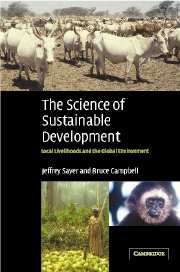Book contents
- Frontmatter
- Contents
- List of figures
- List of boxes
- List of tables
- Foreword
- Preface
- Acknowledgements
- Part I Integrating natural resource management
- 1 The challenge: alleviating poverty and conserving the environment
- 2 Dealing with complexity
- 3 Getting into the system: multiple realities, social learning and adaptive management
- 4 Issues of scale
- 5 Models, knowledge and negotiation
- Part II Realities on the ground
- Part III The research–management continuum
- Bibliography
- Index
1 - The challenge: alleviating poverty and conserving the environment
Published online by Cambridge University Press: 18 May 2010
- Frontmatter
- Contents
- List of figures
- List of boxes
- List of tables
- Foreword
- Preface
- Acknowledgements
- Part I Integrating natural resource management
- 1 The challenge: alleviating poverty and conserving the environment
- 2 Dealing with complexity
- 3 Getting into the system: multiple realities, social learning and adaptive management
- 4 Issues of scale
- 5 Models, knowledge and negotiation
- Part II Realities on the ground
- Part III The research–management continuum
- Bibliography
- Index
Summary
One of the anomalies of modern ecology is that it is the creation of two groups, each of which seems barely aware of the existence of the other. The one studies the human community almost as if it were a separate entity, and calls its findings sociology, economics and history. The other studies the plant and animal community and comfortably relegates the hodge-podge of politics to the liberal arts.
The inevitable fusion of the two lines of thought will, perhaps, constitute the outstanding advance of the present century.
Aldo Leopold, 1935Sixty-five years ago, Aldo Leopold laid down the challenge of developing a science of integrated natural resource management. But a vast gulf still exists between the high priests of theoretical ecology, the gurus of social processes and the real world of resource managers (farmers, fishers and foresters). In this book, we will attempt to understand why the manifestly sensible goal of managing natural resources in an integrated manner has proved so elusive. Our concern is with developing countries and with the effectiveness of attempts to promote ‘sustainable development’ for the vast populations of the world's poor people.
Many development assistance agencies now aspire to the dual missions of alleviating poverty and conserving the environment. Meanwhile, conservation organisations are claiming that their activities are yielding benefits for the poor. All are implying that natural resources can be managed in ways that achieve immediate benefits for local people whilst sustaining long-term local and global environmental values.
- Type
- Chapter
- Information
- The Science of Sustainable DevelopmentLocal Livelihoods and the Global Environment, pp. 3 - 28Publisher: Cambridge University PressPrint publication year: 2003



